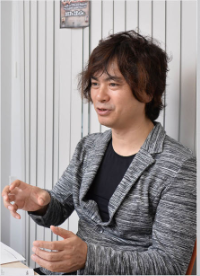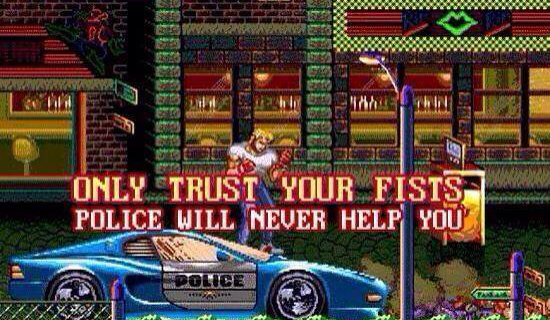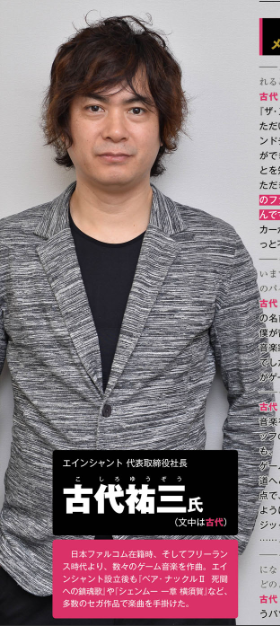 Yuzo Koshiro (President of Ancient)
Yuzo Koshiro (President of Ancient)
He’s composed music for numerous games, both with Nihon Falcom and later as a freelancer. He also worked on a lot of Sega games, such as Streets of Rage II and Shenmue, after establishing his company Ancient.
Having started as a composer specializing in game music long before game music was established as a genre, Yuzo Koshiro is a game music composer that worked on many different Sega titles. What was the Mega Drive era like for him? He told us inside stories of composing for the Streets of Rage series, his honest opinion on the eagerly awaited Mega Drive Mini, and more!
Feeling That The Mega Drive May Not Lose Out To The Arcade
Please tell us about what got you started on composing for Mega Drive titles.
(Koshiro) It started with getting an offer to compose the music for Revenge of Shinobi when I was a freelancer. They were looking for outside people to compose for them, even though they had their own sound team. I’d heard that they knew about me, and so they ended up reaching out to me with that offer. I was actually a Sega fan from the beginning, and had even made a related fanzine with a friend of mine. It felt very strange to get an offer from a company that I was already so familiar with.
As a freelancer that specialized in game music, you were kind of a pioneer for today’s “game music composers”, weren’t you?
(Koshiro) I didn’t actually name it that myself, and I don’t have any particular attachment to that specific name for the job or anything. When I began getting involved in music composition, being a “game music composer” wasn’t really a thing yet. In that era it was the sound staff for that particular company who made the music.
Right.
(Koshiro) Furthermore, it was very rare for someone to work on game music as their primary job. It was almost always done by someone on the development staff who could compose music, like me, doing it alongside other programming tasks. I thought that being a game programmer would be my path to music composition, but luckily I was allowed to specialize in composition early on. And those are the circumstances behind me eventually being called a “game music composer”.
So then you’d gotten involved with the Mega Drive hardware, but what did you actually think about it when you knew about the hardware capabilities?
(Koshiro) I was composing on the PC-8801 computer at the time, and the sound generation on the Mega Drive was basically the same in terms of configuration. So I thought that with the Mega Drive, I’d be able to make use of the knowledge and techniques that I’d built up so far.
Was that a really big advantage compared to hardware from other companies?
(Koshiro) It was a 16 bit machine in a time when 8 bit was commonplace, even with computers. There was a huge technical gap between home console and arcade games back then, and the whole industry was trying to do anything they could to catch up. Then the Mega Drive came out and reduced that gap considerably. It even surpassed the computers at that time in terms of processing power for games, so I honestly thought that an amazing piece of hardware had finally arrived.
Were there new methods of composition that were only possible on the Mega Drive?
(Koshiro) The sound generation had basically the same configuration as a computer, so no real new methods came to me. It was more me making improvements to the programs that I originally used to make them more efficient, for more precise sound creation.
By the way, what sorts of methods did you use for song composition back then?
(Koshiro) Nowadays I have reference materials and movie files sent to me through email, and I compose songs based on those. But back then the materials were limited to only scenarios and character illustrations. So I’ve had to write songs based on nothing but background illustrations and my own imagination.
Establishing A Unique Style Of Composition
I’d like to ask you a bit about a famous series that you’ve composed for, Streets Of Rage. Those compositions are known for having a club music feel to them, but why is it that you were going for that feel?
(Koshiro) When I first started composing music I had the perception that arcade titles were the pinnacle of gaming. So I went into composing with my motivation being that I wanted to surpass them. But by around my third year of doing that, I came to realize that I wanted to make my own music and not be so fixated on arcade games. So while I was struggling to find a new direction to go in, Sega began putting a lot of effort into expanding overseas.
That was around the time that the Japanese game industry started being noticed worldwide, right?
(Koshiro) That’s right. And so I started thinking that if Sega’s going overseas, don’t I have to make music for video game fans overseas too? As I was looking for ideas, the club music that I heard in Los Angeles (where I just happened to be visiting) had a very strong impact on me. The music scene over there was way more advanced than it was in Japan at that time. Thinking that I could somehow leverage that to create game music, I started messing around with different things just through trial and error. And that’s when the request to compose music for that title came in…
And by “that title” you mean the first Streets Of Rage game!
(Koshiro) Right. I felt that there wasn’t another game that would go this well with club music. I accepted the request right away, and from there I went about composing songs aimed at American and European gamers.
It was also well received by Japanese fans, and it went on to become a classic. I’ve also heard that you developed software specifically for use in this series…?
(Koshiro) You’re talking about Streets Of Rage III. I made the songs for the previous two games with techniques that I’d previously developed. But for Streets Of Rage III I thought to introduce automatic composition, by using a program where the computer comes up with phrases. The techno scene was very focused on incorporating the use of random phrases, musical phrases that a human couldn’t come up with. I wanted to incorporate that as well, so I tried to put together a program to do it myself.
With such an experimental component to the newest entry in the series…what kind of reaction did gamers have to that at the time?
(Koshiro) It wasn’t really a big hit, and not everyone saw the value in it. I was told by someone that they felt sick if they listened to it in the morning.
I see (Laughs). And what was Sega’s reaction to your efforts?
(Koshiro) Apparently there were some who thought “Is it okay to use this kind of music?”, but the producer and director made the call to use it. I’m grateful that they were so open-minded in being accepting of music that they’d never heard before.
That defiant stance is a very Sega-like one to take (Laughs) Would you tell us which Mega Drive title that you have the most emotional attachment to?
(Koshiro) If I have to pick one…it would be an action RPG called Beyond Oasis (The Story of Thor). It was a title that I was involved in from the planning stages, and the music in it was very distinct. It uses the automatic composition program from Streets Of Rage III, but it’s very memorable because it represents taking on the challenge of an orchestral sound on the Mega Drive’s sound hardware. Of course the game itself is also well balanced, and it’s still a fun game to play even now.
You made use of an orchestral sound in ActRaiser on the Super Famicom as well. It may be a naive question, but even though you’re going after the same sort of orchestral sound, does the composition method change with the console hardware?
(Koshiro) The Mega Drive uses FM synthesis (which characteristically has a bit more of a metallic tone to it), which can’t really express the deep musical scales of an orchestra as is. But if you figure out the right configuration and note placement, you can make it sound like an orchestra. I found a solution after much trial and error, and implementing that was a new and fresh experience for me.
Thank you for this valuable conversation. Finally, could you please give us your thoughts on the upcoming Mega Drive Mini, on which some works of your works will most likely be included?
(Koshiro) I expect that the Mega Drive Mini will be a condensed version of Sega’s allure from the 80s into the 90s. I’d like for not only the people who played the original Mega Drive back in the day to get one, but also those who didn’t experience the enthusiasm the first time around. When I look at it with fresh eyes, I really feel that…there’s no other piece of hardware that has this cool of a design (Laughs). It’s definitely a symbol of the era where Sega was on the cutting edge. I’m sure it will have all sorts of charming titles, in terms of music and otherwise. So I’m really looking forward to its release.
Yuzo Koshiro’s Top 5 Mega Drive Titles
Yu Yu Hakusho: Makyou Toitsusen
This is absolutely my number one title. I have nothing but great things to say about it. I always used to play it in 4-player mode.
Gunstar Heroes
A title that is overwhelmingly flawless, and doesn’t produce a single bad sound. The visuals, music, and controls are all perfection.
Sonic The Hedgehog
This has to be a part of any conversation about the Mega Drive. It wouldn’t be an exaggeration to call this title a miracle.
Michael Jackson’s Moonwalker
A miraculous action game supervised by MJ himself. It’s a nearly flawless work, and is still fun to play now.
Streets Of Rage II
A very memorable title in which my company was involved. And of course, I guarantee that it’s fun.

